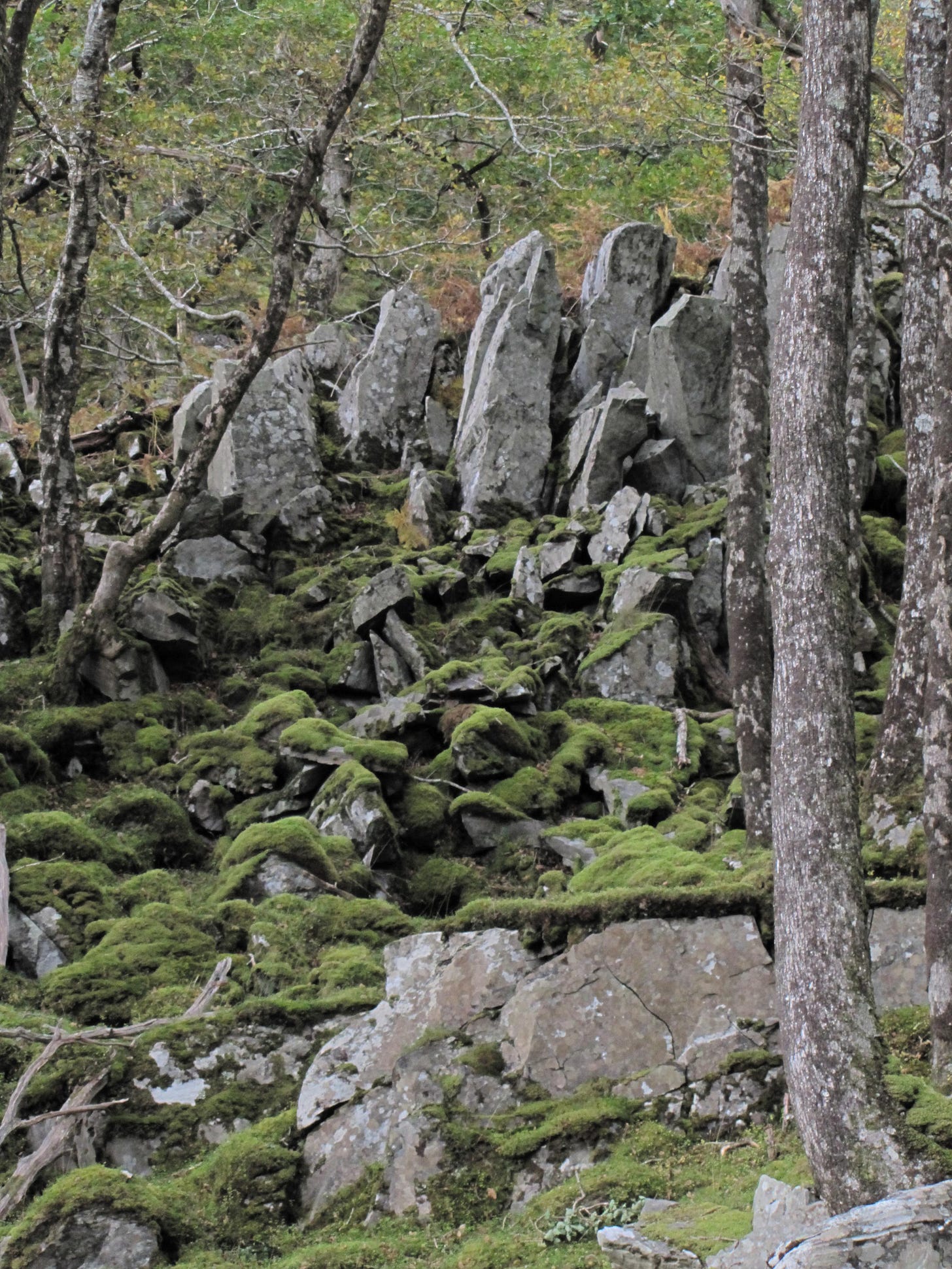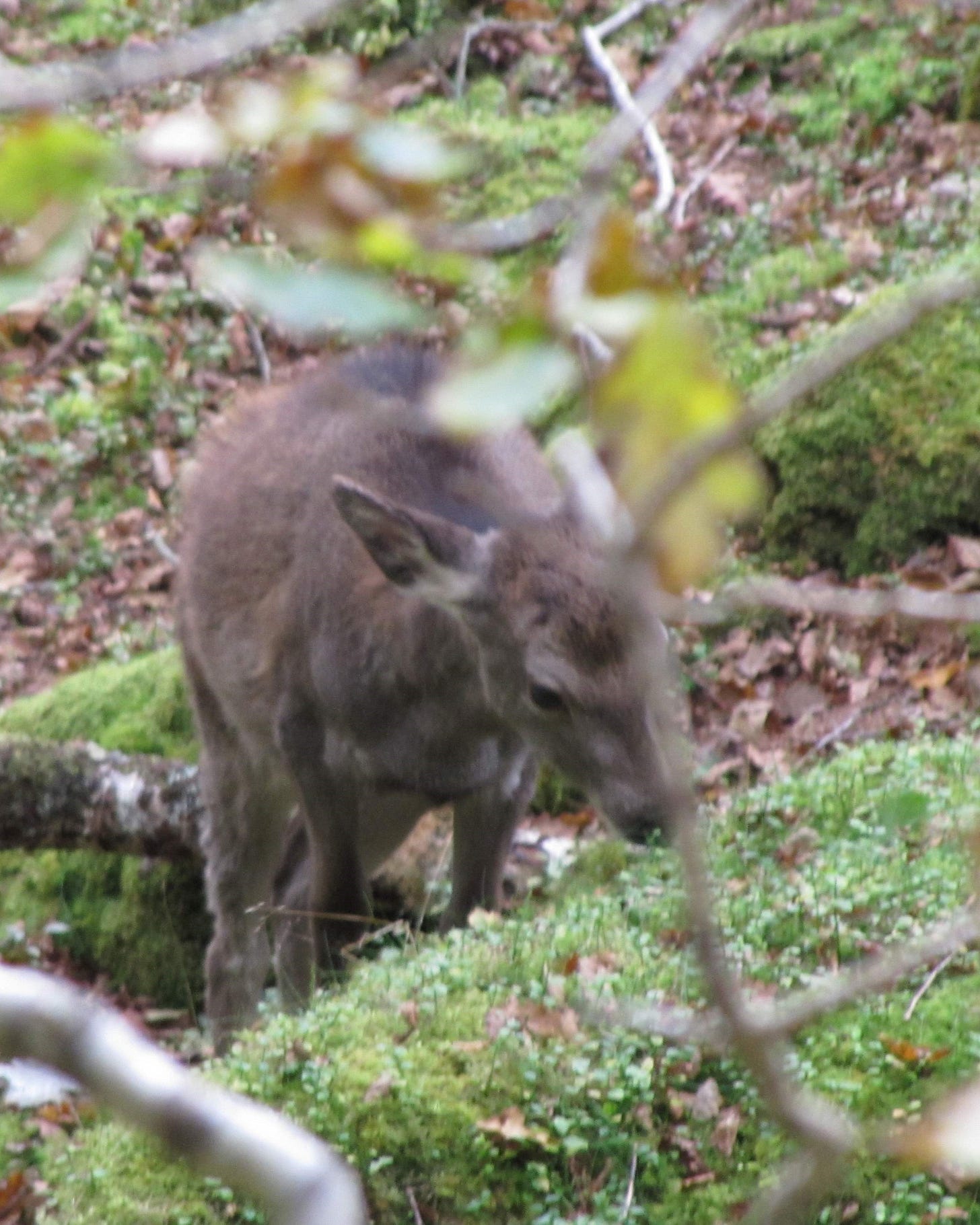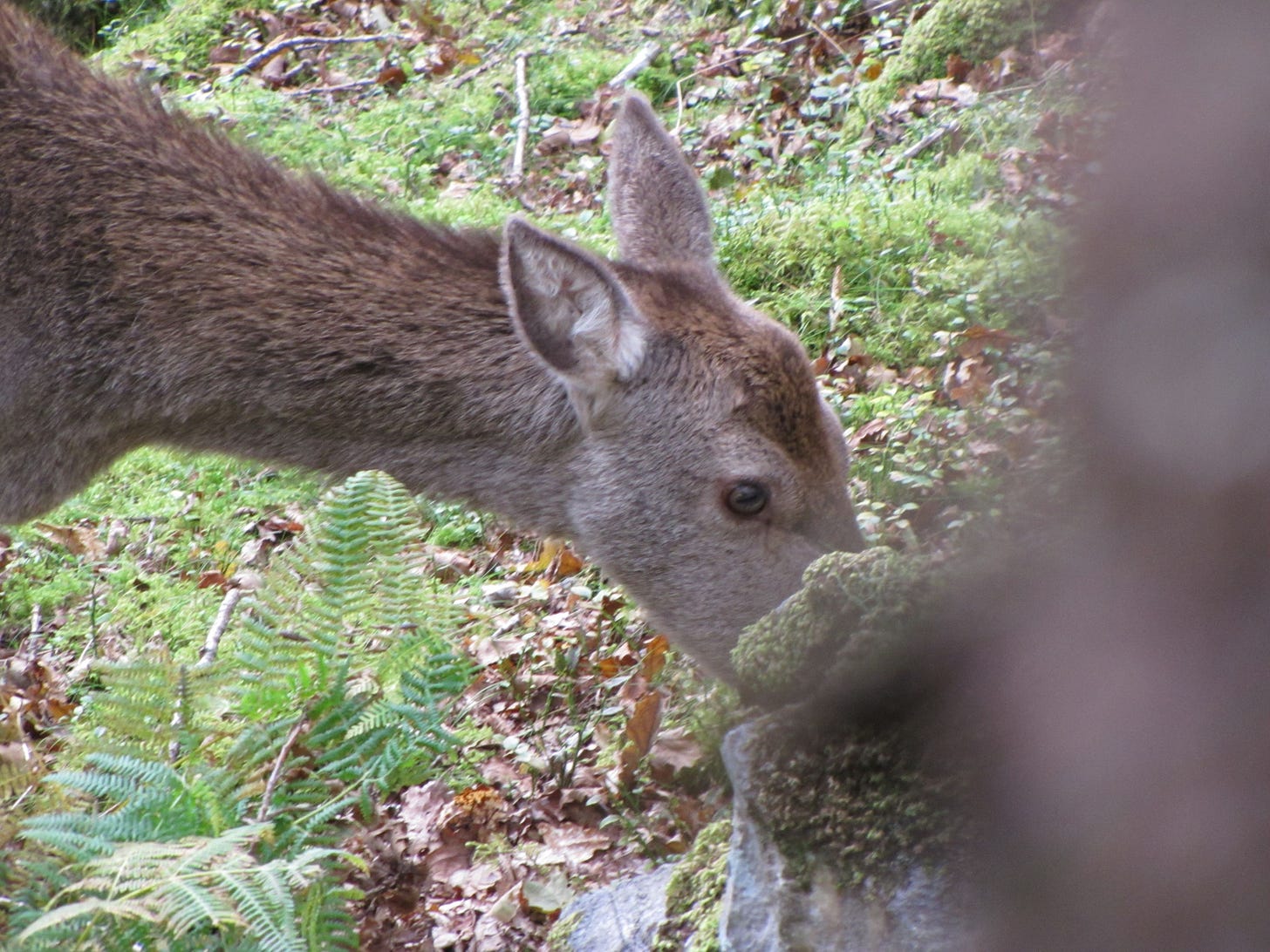Using All The Senses
Awe Season One Episode Four: Learning a new level of self-respect
We need to listen to ourselves.
Knowing when it is wise to pause, to not do something, and understanding when you should push yourself to do it is a fine, fine line. This holds true in many walks of life, and especially for learning to live as a part of nature.
Respecting who you are, respecting your choices in a busy, distracting and fast world is a tool too many of us neglect to keep honed. It is, however, something we can take out of the box, sharpen, and learn to use again, at any time.

Often, it is easier to simply be pulled along with the current, endlessly doomscrolling through social media or the news, or putting the television on to watch whatever is on, simply because you feel too tired to do something else. I understand this, I’ve been there and pulling myself out was not easy.
We read headlines from various sources, promising that it is easy to change your life for the better—just sign up and pay, and you too can learn the secret of a successful and happy life.
Is it really this easy?
No. And, perhaps, a little bit yes.
No, because this is not a quick fix solution, no, because it can be suffocating to live at this frantic pace we have created, no, because it is all too easy to fall back into negative patterns. Then we feel trapped, demoralised, and unable to try again.
Yes, because one of the answers is quite simple—nature is the cure and, I would argue, the best version of this healing method is to learn as much as you can about how to live within and as a part of nature.
This falls largely into two, often mistakenly separated, camps—the practical, physical skills needed, and those which require more explanation, sometimes referred to as instinctual, or perhaps even spiritual.
The former camp—how to light a fire, how to skin a rabbit, how to prepare nettle cordage—is what you can easily discover on the internet, in books, and through taking most of the available courses. They are often called survival or bushcraft skills and have been co-opted into prepper culture: those who learn these skills and methods as they see them as essential to surviving a coming war, or worldwide collapse of some kind.
Personally, I still have hope that it will not come to that, but I can see the validity of learning things that will keep you and your family safe, whether the power and water keep flowing, or not. (NOTE: one big issue I DO have with this subculture is those who follow the idea of the lone wolf, building supplies, whether ammunition or cans of beans, somehow convinced they will stay alive, alone. This is not going to happen, by and large—in event of some sort of collapse, a solid community will be utterly essential.)
And, of course, many of those who initially set out to learn those skills—how to find drinking water, how to knap stone tools, how to track a deer—do so initially from a practical stance then, over time, they begin to listen to their enlivened instincts, to a revived intuition, and learn to respect that, adding depth to their knowledge.
Both of these camps—physical skills, and those which could fall under spiritual or instinctive skills—are not only valid, but essential to this journey. Our ancestors would not have separated them, but viewed them as the same path. I believe we should do the same, yet I am well aware of the pitfalls associated with this approach. Too often, to talk of the Other, to talk of a sort of ‘sixth-sense’ is to alienate large sections of those who would otherwise be engaged with this process (there are, of course, far more than only five senses, as I discuss below).
This project, not just this season, but all those to come, will definitely cover both camps. For this portion of the journey, I will give you a simple and perhaps simplified example of learning to listen to your instincts—of learning to respect what you might otherwise reject as a ‘feeling’, whether this comes from the senses you know and understand, or somewhere else.
Consider using an axe. Imagine you are out in the woods, trying to find a straight and crowded young tree to cut, in order to harvest and use its wood and bark for crafts. You find what appears to be the perfect tree, but something about the location makes you feel uneasy. Instead of simply unsheathing your axe and chopping away, you pause and use all your senses, dedicating more time to examining this strange feeling you had.
Perhaps you discover that the footing is simply too treacherous, making your unbalanced swing all the more dangerous, or you notice a large dead branch caught higher up which, at first glance, was not obvious and liable to fall if you begin to cut. Perhaps you realise there is a nest—or series of nests, in some cases—in the tree, whether birds or bees or wasps, or you realise that dark hole by your feet is actually a fox den beneath the roots of the tree.
Sometimes, we immediately notice things without actually consciously registering them. This is a innate and inbuilt thing, a combination of our senses filtered in a manner our ancestors would have found incredibly useful and, indeed, essential. You need to learn to listen to this voice, to respect it. Too often, we as a species don’t. We assume we know best and, perhaps, proceed to cut down the tree, slip and cut ourselves instead, or have a branch (often called a widowmaker, with good reason) fall on us.
Even after a good look, it can be possible to miss things—but something, that little itch at the back of your head, tells us to looks again.
Our instinct—our intuition—can be a powerful force, yet one which we, in our modern, busy world, often fail to respect. Before you can immerse yourself in nature, you need to begin the process of turning this intuition back on or, more accurately, beginning to listen to it carefully. It is not always an easy process.
One of the beautiful things about this whole topic—of allowing nature into our lives in a deeper fashion—is that this intuition can be sharpened as we proceed with our studies. By learning the physical skills, by identifying trees, plants or animals, we can then begin to deepen our appreciation and understanding of ourselves too.
Every step on this journey leads to another path, sometimes a short one, at others longer and meandering, forking and returning together with another. It is impossible to reach the end of the journey.
Building Homes
Let’s look at another practical example; in this case, building a shelter from natural materials. Shelter design and construction is such a vast subject that entire books have been written on it and, while these are worth reading and studying closely, you will also have to approach every shelter you build in a unique fashion—no two natural shelters will ever be the same.
First, we need to consider where to place the shelter, near enough to water that it is not an excessive chore to gather it, but far enough away that associated temperature drops, humidity, and insects do not cause an issue. Is the site off an animal trail, or away from the potential of falling trees or tumbling rocks?
Next, we need to assess what materials we have around us to use and ask ourselves more questions. How big can we make the shelter? How big does it need to be? How long do we want it to last? Is it to contain a fireplace, or is that not needed? Does it need to be fully wind- and waterproof or merely something to keep the sun off us? There are so many questions to ask, even before construction begins, each leading to another.
With time, experience and practice, we can speed up this process a little and a major part of that is through respecting our inner voice. Sometimes, we’ll find a glade or an open patch on top of a short spur of hillside and we’ll instantly feel at home. We’ll know this would be a great place to set up camp, or to build a shelter—and much of this is due to a combination of experience and our subconsciousness picking up on the signs our senses might not immediately, openly register.
Likewise, the practical knowledge of the trees or materials available in a chosen campsite becomes almost second nature—once you know those species, once you know how to use them, they are a part of you in a way which is hard to explain.

Closing Your Eyes
Here’s a task for you, one which is easy enough but can place you in the right mindset for truly learning about a place on a much deeper, sensual level.
On a day where there is wind, find somewhere with vegetation—a woodland is best for this, but prairie or grassland, dunes, or even heather moorland work too. Look around you, note the different species you see—there’s no need to know what they are at this stage, just recognise one plant as being different to another.
Now, close your eyes, and listen to those plants. Again, trees are the easiest example, but what you are trying to discover is how each plant sounds slightly different in the wind—as the leaves flutter, or twigs, branches, or blades of grass move, you can begin to piece together the tapestry of nature through sound alone. Some of you reading this might find it far-fetched, but it is not—listening to the wind in the plants can tell you what species are around you, even if you cannot see them.
This experiment also does something else. As soon as the majority of us close our eyes, we lose our principal sense. Our other senses can take a while to catch up—which is why, when some people believe putting a blindfold on for a time helps them understand blindness, they are wrong: although there is a positive, well-meaning intention here, it can reinforce lazy stereotypes of blind people stumbling around in the dark, unable to perform simple tasks. Which is not the case at all. This is an important lesson: our senses can be trained to provide more data if we either need to—or if we make the conscious effort to do so.
Closing our eyes and learning to use our other senses is something you can do regularly, especially when you are in a place you know well. There’s no real need for a blindfold, and certainly no need to place yourself in danger.
The more you do this, the better you become at trusting your other senses—essentially, you are better at trusting and respecting yourself. Too often, we fall back on the nonsense of having only five senses—we don’t, we have many more, and each of these feeds into our awareness of the world.
To make the most of our time in nature, to learn more about ourselves, we need to learn to recognise all those other sensory inputs.
Wasted Data—Use Your Nose
Even within the ‘big Aristotelian five’—sight, hearing, smell, taste, and touch—it can be all too easy to ignore the data they can collect, ignore all those things which would lead to a greater understanding of nature.
For me, personally, the moment I truly realised this was when I was following a deer trail as a teenager. This was in very close, wet and swampy woodland, and I could not see far ahead. I was not actually trailing the deer, just following its path as an easier way to make it through the tight undergrowth. Suddenly, I startled a roe deer (Capreolus capreolus), who had been resting, hidden in the bracken. As he ran off, barking, I realised I had actually smelled him before I had seen him, the light breeze in my face carrying his scent to me, even if I had not connected that scent with a deer.
This realisation, that I could use a sense as an animal would, stuck with me—it is not really something we are taught in school and, to be honest, many of us would ignore it anyway, our eyes registering the deer, our ears his bark. Why pay attention to his scent?
Since then, I have always made a point of using my nose, of inhaling deeply, nostrils flared, and even tasting the air, as you’ve probably seen dogs or cats do. You can also try sniffing rapidly, again as you’ve probably seen other animals do—this works very well too, pulling in those tiny particles we are actually sensing at a faster rate.
Respect your senses, pay attention to them, and you can learn remarkable things.

Cleansing In Nature
It has become a popular buzzphrase, “forest bathing”, but it has become so with good reason. Being out in the woods, or in any nature you can find, is incredibly good for you. It is, after all, our natural state and also precisely the reason some people find being unable to see manmade structures so terrifying—suddenly, all their senses are focussed on primeval terrors, the fear of the creatures lurking in the dark, the horror of insects trying to bite you, snakes everywhere, and even malevolent plants out to get you. Much safer to stay in the city?
With time spent in nature comes a different way to be. It really does do things to the brain, rewires or reawakens us in a fashion which I believe can help not only ourselves, but our fellows and, crucially, the planet.
In this day and age, it is not easy to carve out time to live out in nature for days or weeks at once. This is something I am well aware of—but, if you can, I wholeheartedly recommend you try and experience the wonders such an adventure can bring. The more isolated, the fewer other humans, the better.
When you can do this, you will notice something remarkable.
I have spent months alone in the woods, surrounded by nature, but with no other people. I have also taken friends out into the mountains and forests, to teach and share some of the skills we need to live amongst wild things.
The thing I have always found is that, after about four or five days out in the woods, away from people and the hubbub of civilisation, I begin to move differently, I begin to slow down, to listen, not just to the sounds I hear, but to my inner voice, to that intuition. All those senses come into play. I have also observed this in others—it is quicker if you are alone, but even with one other companion, you both begin to notice this. We tread more lightly, our steps carefully considered. We pause on the trail to examine a plant or a scuff on the ground. We close our eyes, inhale, and listen.
And with this, with this respect for what our senses and our intuition are telling us, comes a deep feeling of peace and confidence. This can happen on any ‘normal’ camping trip but, add in a richness of ancestral skills and it is considerably heightened. When we have to find shelter, collect and clean our water, cook and warm ourselves around a fire, and maybe add to our supplies through wild foods, we are one step closer to who we perhaps should be, to those who came before, to being a part of an infinite whole.
Ultimately, I would argue that, through this, we are far more than one step closer to ourselves. We are, in a sense, finally at home.




Brilliant read. 👏🏼
I just shared it on Zucker's Threads app. 😄
Very much enjoyed this writing, I found myself nodding at a lot of what you say.